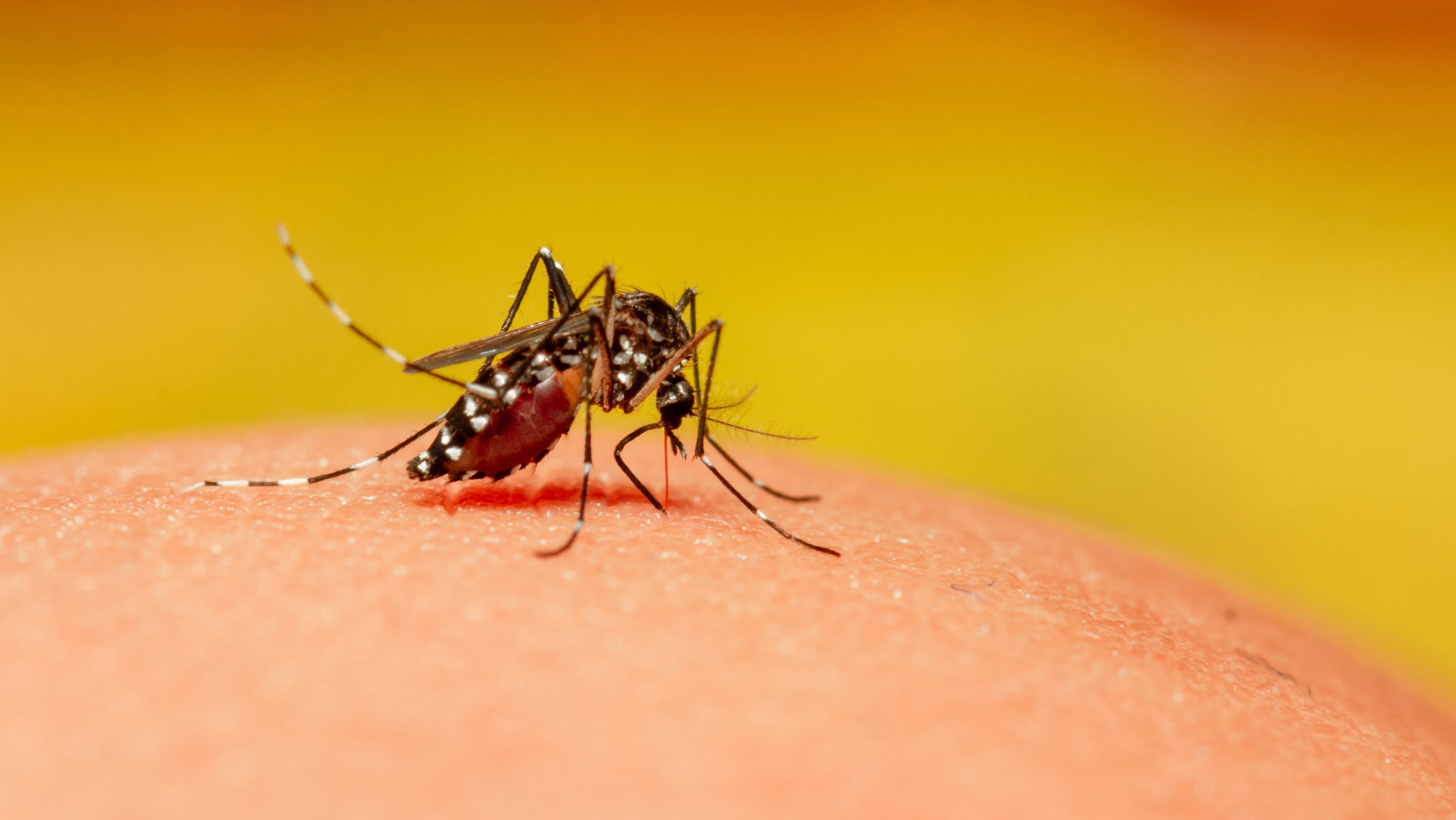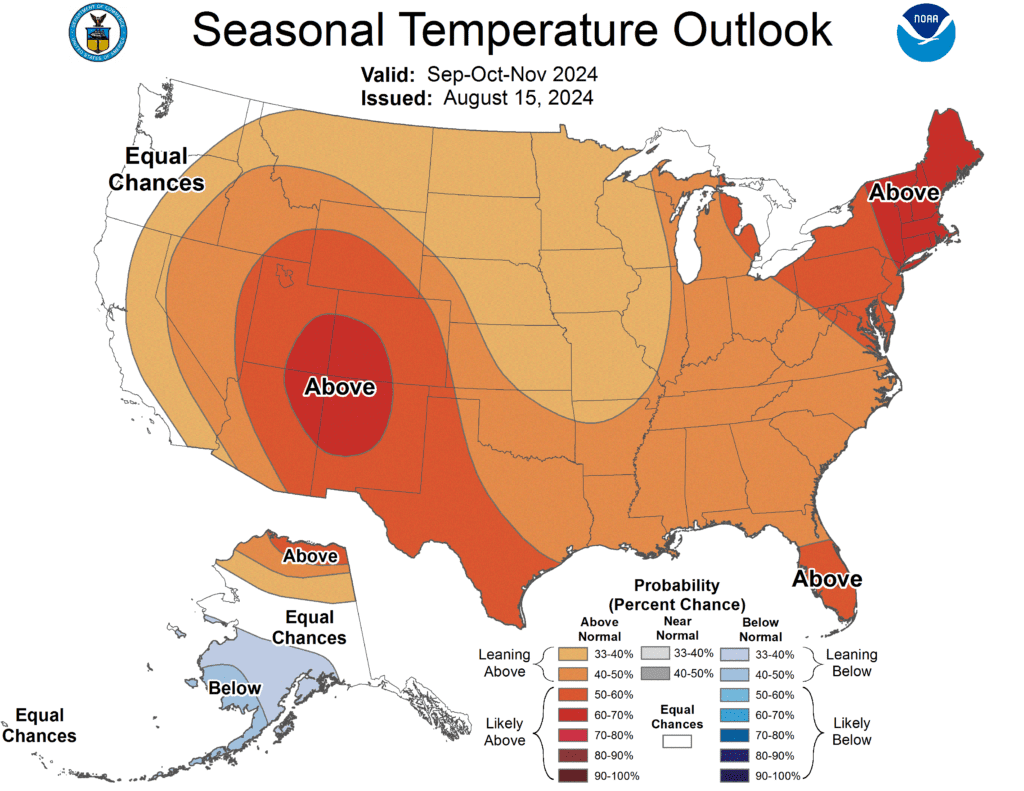

Mosquito-borne diseases, like Eastern Equine Encephalitis (EEE) and West Nile Virus (WNV), have posed a significant threat to public health in New England for years, and have made a dangerous resurgence in the past few weeks. As we head into a warm September, these diseases will continue to be prevalent.
According to the National Oceanic and Atmospheric Administration’s Seasonal Temperature Outlook map for the upcoming fall, New England is expected to experience above average temperatures. Mosquitoes are active until the first frost, so this means we are looking at what will likely be an extended mosquito season in New England.

Understanding what attracts mosquitoes to bite certain individuals over others is essential in creating effective prevention strategies and minimizing the risk of mosquito-borne diseases. This blog delves into the science behind mosquito attraction and how recent research offers insight into the various cues mosquitoes use to find who to bite.
To understand why mosquitoes bite some people more than others, it’s important to look at their complex sensory system. Mosquitoes rely on a range of sensory cues, including smell, sight, heat, and carbon dioxide, to locate their hosts. Interestingly, research has shown that the way mosquitoes detect smells is quite similar to how humans do. As mosquitoes navigate their environment, they rely on specialized olfactory receptors to detect chemicals and odors. These receptors play a crucial role in guiding mosquitoes toward their food sources, particularly blood meals needed for female mosquitoes’ reproduction.
Dr. Charles Pitts, a researcher who studies the sensory mechanisms of mosquitoes, explained that the process of odor detection is strikingly similar in both mosquitoes and humans. In humans, when the nasal nerves detect a smell, they send signals to the brain through olfactory receptors, and a similar process occurs in mosquitoes.
While all mosquitoes feed on nectar, it is the females that rely on blood meals for egg development. When seeking out a host, female mosquitoes are particularly attracted to humans whose sweat contains specific chemical compounds. Dr. Pitts points out that mosquitoes are especially drawn to carboxylic acids found in human sweat. These acids, along with other volatile organic compounds, create strong odors that can be highly attractive to mosquitoes.
“Mosquitoes find their host through attractive odors,” says Dr. Pitts. “As we sweat, we emit volatile odors—strong smells—which can be very attractive to mosquitoes.” This explains why some people seem to be “mosquito magnets,” particularly if their body chemistry produces more of these alluring compounds. Factors like genetics, diet, and even skin microbiome can influence how much a person attracts mosquitoes.
Apart from smell, mosquitoes use other sensory cues to identify and locate their hosts. Carbon dioxide exhaled by humans and animals is a beacon to hungry mosquitoes. As mosquitoes get closer, they use additional signals like the host’s silhouette, body odor, and heat. Recent research has unveiled another fascinating discovery about how mosquitoes detect their prey: infrared radiation.
Historically, scientists knew that mosquitoes could detect heat from warm-blooded hosts, but this cue only worked when they were within 10 centimeters of the skin. Recent studies by Craig Montell, a neuroscientist at the University of California, Santa Barbara, and his colleagues, have provided compelling evidence that mosquitoes can detect infrared radiation from further distances than previously believed. This finding reveals another layer of the mosquito’s sophisticated host-seeking behavior.
Montell’s research team demonstrated that mosquitoes’ ability to detect body heat is enhanced when infrared radiation is combined with other signals like odor and carbon dioxide. In their experiments, they observed that the presence of infrared radiation doubled the chances of a mosquito landing on a surface in search of a blood meal. Infrared radiation allows mosquitoes to detect body heat from up to 70 centimeters away.
The more we understand about how mosquitoes locate their hosts, the better equipped we are to develop new strategies to combat them. For instance, Montell suggests wearing loose-fitting clothing in areas with a high mosquito population to reduce the amount of infrared radiation emitted by the body. This simple yet effective tip could help people minimize mosquito bites in outdoor settings.
Another potential application of this research is developing new mosquito repellents or traps that exploit mosquitoes’ reliance on multiple sensory cues. For example, understanding that mosquitoes use a combination of infrared radiation, carbon dioxide, and odor to locate hosts could lead to multi-sensory traps that are more effective than current models.
The complex sensory systems that mosquitoes use to find their hosts—relying on smell, carbon dioxide, heat, and now, confirmed infrared detection—highlight their adaptability and resilience. By understanding how mosquitoes use multiple sensory cues to locate their prey, we are better positioned to create innovative mosquito control methods that reduce the impact of these dangerous insects on public health. Whether it is through new repellents, traps, or simple lifestyle changes, the knowledge gained from this research can help us outsmart mosquitoes and safeguard our communities from vector-borne illnesses.
Remember, a warm fall means the first frost when mosquitoes become inactive will likely come late in the season. Until then, practice the following mosquito prevention tips to protect your loved ones from dangerous mosquito-borne illnesses. Stay safe and enjoy more time outside!
Learn more about mosquitoes, and mosquito-borne illnesses from the CDC. Also, have you wondered how a world without mosquitos would look like? Explore our FAQ blog to discover more about their life and behavior.
Further reading: Winter Tick and Mosquito Prevention: What You Can Do in Your Backyard Before Spring